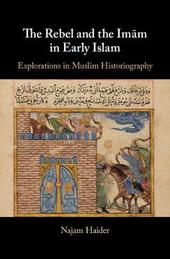
|
The Rebel and the Imam in Early Islam
Hardback
Main Details
| Title |
The Rebel and the Imam in Early Islam
|
| Authors and Contributors |
By (author) Najam Haider
|
| Physical Properties |
| Format:Hardback | | Pages:316 | | Dimensions(mm): Height 235,Width 156 |
|
| Category/Genre | Islam
Islamic life and practice
Islamic theology |
|---|
| ISBN/Barcode |
9781107026056
|
| Classifications | Dewey:956.013072 |
|---|
| Audience | |
|---|
| Illustrations |
Worked examples or Exercises
|
|
Publishing Details |
| Publisher |
Cambridge University Press
|
| Imprint |
Cambridge University Press
|
| Publication Date |
19 September 2019 |
| Publication Country |
United Kingdom
|
Description
Engaging with contemporary debates about the sources that shape our understanding of the early Muslim world, Najam Haider proposes a new model for Muslim historical writing that draws on Late Antique historiography to challenge the imposition of modern notions of history on a pre-modern society. Haider discusses three key case studies - the revolt of Mukhtar b. Abi 'Ubayd (d. 67/687), the life of the Twelver Shi'i Imam Musa al-Kazim (d. 183/799) and the rebellion and subsequent death of the Zaydi Shi'i Imam Yahya b. 'Abd Allah (d. 187/803) - in calling for a new line of inquiry which focuses on larger historiographical questions. What were the rules that governed historical writing in the early Muslim world? What were the intended audiences for these works? In the process, he rejects artificial divisions between Sunni and Shi'i historical writing.
Author Biography
Najam Haider is a Professor in the Department of Religion at Barnard College, New York. He is the author of The Origins of the Shi'a (Cambridge, 2011) focusing on the role of ritual and sacred space in the formation of Shi'i identity and Shi'i Islam (Cambridge, 2014) which examines three branches of Shi'i Islam - Zaydi, Twelver, and Ismaili, through a framework of memory. He has travelled extensively in the Middle East, including Syria where he was a Fulbright scholar and Yemen where he studied with traditional Zaydi scholars.
Reviews'... this uncompromising analysis will appeal to scholars of early Islam as well as to students of politics and rhetoric - especially those concerned with the interplay among truth, fact, fiction, and influence in scholarly and aesthetic writing ... Highly recommended.' R. A. Miller, Choice
|